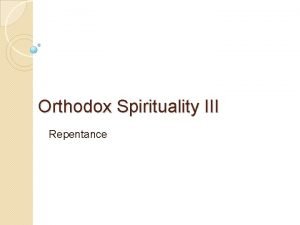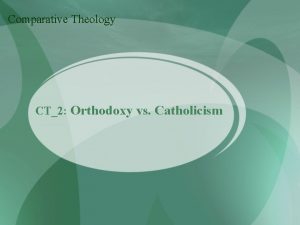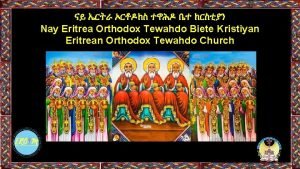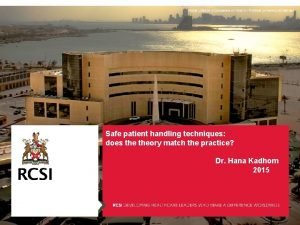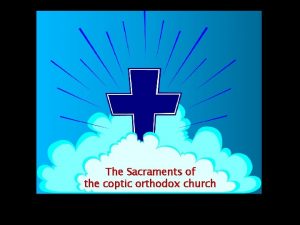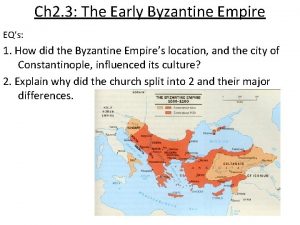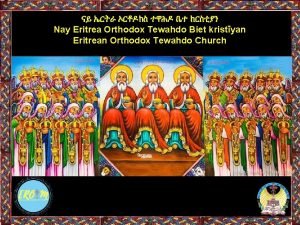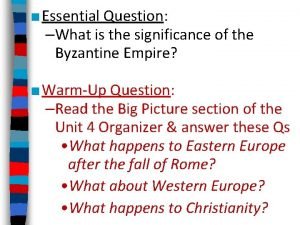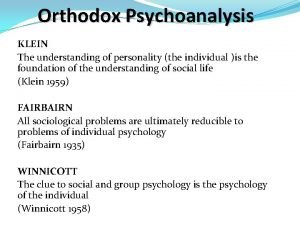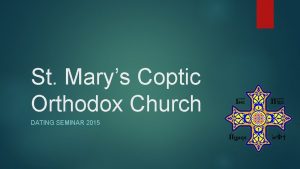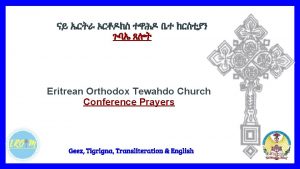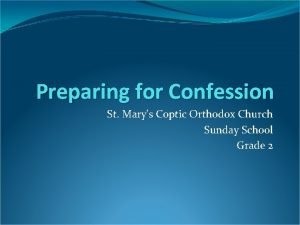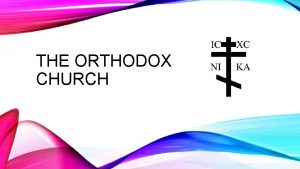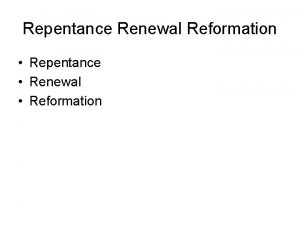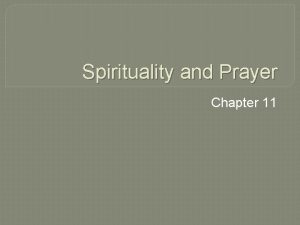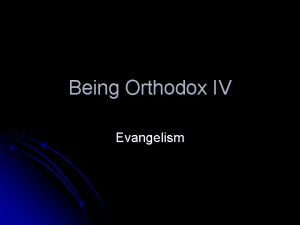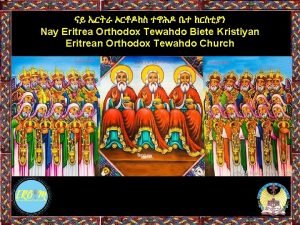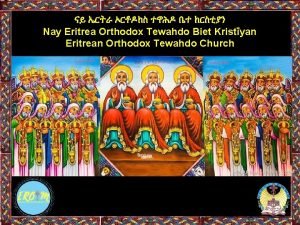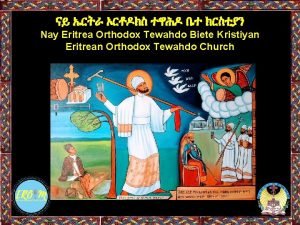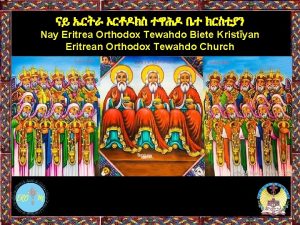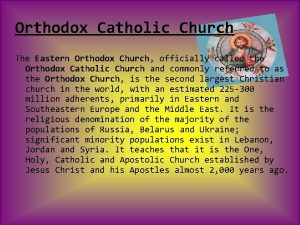Orthodox Spirituality III Repentance Repentance in Greek is
















- Slides: 16

Orthodox Spirituality III Repentance

�Repentance in Greek is “metanoia” �Meta = change �Nous = the eye of the heart; the guide of the soul �We understand repentance as a turning away from that which displeases God, falls short of His glory, His will, and a return to Him and to what He desires for us. ◦ We see sin as missing the mark and falling short of God’s glory, but in a relational way rather than a juridical or legal way. ◦ Repentance, therefore, is turning back to God, coming back home to Him.

The Prodigal Son

“Repentance is an act of reconciliation, of reintegration within the Body of Christ, which has been torn asunder by sin. ” (Fr. John Chryssavgis)

“Repentance is salvation, but lack of understanding is the death of repentance. ” (St. Basil the Great) In a way, we will not be judged for our sins, but for not repenting.

Penthos is the conditioned sorrow of a repentant soul. Penthos consists of mourning for the loss of God’s presence; it makes for sorrow at His absence and thirst for Him.

�"Repentance is a Mystery through which he who repents for his sins confesses before a Spiritual Father who has been appointed by the Church and has received the authority to forgive sins, and receives from this Spiritual Father the remission of his sins and is reconciled with the Deity, against Whom he sinned. . . Repentance signifies regret, change of mind. The distinguishing marks of repentance are contrition, tears, aversion towards sin, and love of the good" St. Nektarios of Aegina, Cavarnos, pp. 174 -5

The Holy Mystery of Confession One of the holy Mysteries (sacraments) of the Church, ◦ a. Instituted by Christ Himself after His resurrection ◦ b. exomologisis: Literally means to “agree out loud with God” ◦ c. Confessions are always to God, out loud, in the presence of the priest, face-toface.

A Good Confession is not enough. We must also turn back to God in faith and move away from the sin. We must remember that the Church is a hospital ◦ Christ is our doctor ◦ We have come to confess sins; our own not others

Aids to a Good Confession KEEP TRACK OF YOUR SINS: ◦ "St. Basil the Great, mouthpiece of Christ and pillar of the Church, says that a great help towards not sinning and not committing daily the same faults is for us to review in our conscience at the end of each day what we have done wrong and what we have done right. Job did this with regard both to himself and to his children (cf. Job 1: 5). These daily reckonings illumine a man's hour by hour behavior" Philokalia, Vol. I, p. 174, St. Hesychios-On Watchfulness & Holiness

Aids to a Good Confession DON’T DELAY CONFESSING ◦ "The longer we delay confessing, the worse for us; the bonds of sin become more and more entangled and it is more difficult to render a true account of our trespasses. The sincerer the confession, the more peaceful our soul. ' When confessing we must openly disclose our most shameful sins to our spiritual father, although it is painful, shameful and humiliating, otherwise our wounds will remain unhealed, and, in time, will destroy our spiritual health. The priest is a spiritual doctor- show him your wounds without shame. . . remember that your spiritual father has to love you more than your own father and mother, because Christ's love is higher than carnal love and because he is responsible for you before God" The Life of Father John of Kronstadt, Bishop Alexander, p. 118

The Priest, Father Confessor, Spiritual Father and the Elder

The Parish Priest � The age of a parish priest can vary from a very young priest fresh out of seminary to an elderly priest who has had vast experience in parish life, spanning several decades. Generally parish priests are married, although there are occasions of monastic priests (hieromonks) serving parishes, or even unmarried, non-tonsured priests.

The Father Confessor � This is a priest who hears one’s confession. Most generally, this would be the parish priest, but not in all cases. He may be in another parish, a retired priest, or a hieromonk in a monastery. He hears your confession and perhaps gives some limited advice and should give a penance for your sins for the sake of healing.

The Spiritual Father Again, this may be the parish priest, or it can be a priest in another parish, a retired priest, or a hieromonk. This relationship is deeper than that of a confessor. The priest may give more guidance, get more involved in your rule of prayer, impose and/or approve of a specific ascetic undertaking. He is a guide along your path to salvation. He is not a guru, nor a taskmaster, nor a sergeant. He should advise, counsel exhort and uphold the Holy Tradition and Canons of the Church, but he should not demand or seek obedience and certainly not monastic obedience. He knows that obedience is something that is freely offered, and monastic obedience finds its unique expression within a monastic community, expressed by those who have received it from one generation to another for centuries. The Spiritual Father respects a person’s free will, his/her individuality. His counsel should always reflect the Church’s teachings, not his own opinions or his own will.

The Elder This title is almost always reserved for a monastic spiritual father or mother who is usually advanced in years, has spent decades in the monastic life and has lived under strict monastic obedience. The disciple under the care of an elder asks the elder for a blessing for everything he/she does and reveals all of his/her thoughts to the elder. The elder/disciple relationship is very deep and spiritually intimate. The obedience in this type of monastic relationship is much more binding than in the world and is most often only practical within the monastic life.
 Repentance in greek
Repentance in greek Hamlet act iii scene ii
Hamlet act iii scene ii The drag lift in manual handling
The drag lift in manual handling Orthodox doctrine
Orthodox doctrine Hail to you mary coptic hymn
Hail to you mary coptic hymn Metsagu
Metsagu Orthodox lifting in nursing
Orthodox lifting in nursing 7 sacraments orthodox church
7 sacraments orthodox church Roman catholic vs eastern orthodox
Roman catholic vs eastern orthodox Selam leki tselot
Selam leki tselot Differences between catholic and orthodox
Differences between catholic and orthodox Orthodox psychoanalysis
Orthodox psychoanalysis Coptic orthodox dating rules
Coptic orthodox dating rules Thubden orthodox
Thubden orthodox Christian bale orthodox
Christian bale orthodox Eritrean orthodox tewahdo prayer
Eritrean orthodox tewahdo prayer Confession coptic orthodox
Confession coptic orthodox
